(Psst: The FTC wants me to remind you that this website contains affiliate links. That means if you make a purchase from a link you click on, I might receive a small commission. This does not increase the price you’ll pay for that item nor does it decrease the awesomeness of the item. ~ Daisy)
Want to know how to get started on your life of epic Cheapskatery? It’s easy. Stop spending money. I’m talking about a total spending freeze.
Duh. No joke.
But you see, most people spend money every single day.
I’m not talking about your day-to-day necessities like house payments and fuel for the vehicle. I’m talking about those little impulse buys that most of us make without thinking twice about them.
We spend more money than we realize on silly things. If you spend money on the following, you could go a lot longer than you think without spending.
- Drive-thru coffee
- Delivery or takeout pizza
- Lunches out with friends from work
- Buying a drink while you are out
- Buying magazines
- Going for manicures/pedicures/facials
- Driving places just to have something to do
It’s these little things that add up and can take an enormous chunk out of your budget. We’ve become a nation of consumers that think nothing of plunking down 5 times the value for something because we’re out and it’s convenient.
Little changes make a big difference.
Instead of the above, you could make some small one-time investments and…
- Bring your own coffee in a big thermos from home
- Make pizza from scratch
- Organize a workplace potluck
- Keep a small cooler in your vehicle with drinks from home
- Read online
- Change to a simpler beauty regimen
- Stay home
By doing this, you could save thousands of dollars per year.
Let me be clear: I’m not saying we should never have a treat. When we lived in the boondocks, we’d go out on a major supply shopping trip once a month, and we’d often grab a coffee out when we did so. That day was our big outing and picking something up then is a treat. That’s because a treat is, by definition, something outside the norm. When you do something every single day, it’s no longer a treat – it’s a habit, and an expensive one in this case.
Consider these big questions: How deeply ingrained is your spending habit? Could you institute a personal spending freeze for an entire week? For a month? How long could you go without spending money?
Breaking the spending habit with a spending freeze.
Spending itself is a habit. If you can break the habit of thoughtless spending, you’ll be much further ahead. You can put that money towards large investment purchases that you never realized you could afford. If you saved $1300 in Starbucks spending, at the end of the year you could make one large purchase that could help your family be in a better position. Now imagine if you corralled all of that frivolous spending what you could do.
Prices are going up, incomes are staying the same, and jobs are getting lost and not replaced. It’s better to start now on the road towards non-consumerism, than when you are forced to do so in order to eat. I’d rather these things be my choice, not just the effect of a personal financial downturn.
Here’s how to start a spending freeze:
First, give yourself an allowance.
That’s right – give all of the people in your family who spend money an allowance. Make it cash, and collect the bank cards, credit cards, etc. This doesn’t mean that purchases cannot be made, but it will take some effort to do so, and that effort will give you time to think it through. Do you really need that pair of shoes that goes with that one outfit in your closet? You know, the outfit that you wear once every two years?
By giving yourself a little cool-off time, you’re less likely to make regrettable purchases that just don’t add enough value to your life. By having your spending money in cash, you have a very tangible way to see how much you’ve spent.
Your goal should be to finish the week with a little money left over, instead of ending the week trying to dip into next week’s money. This also helps to limit the amount of frivolous spending that any family member can do.
Pay for the essentials before you start your spending freeze.
Do you want to get started on your spending freeze?
- Make a careful list and plan your meals, 3 per day, for the next week.
- Fill up your car with gas and put aside cash for more gas if you use more than a tank per week.
- Pay your bills.
- Then lock up your bank cards and credit cards and put away your cash.
Now, see how long you can go without spending anything. Nothing will make you more aware of your normal habits than stopping them completely.
Because I work from home and have no regular place to spend money, this is a little easier for me than it is for someone who goes to work outside the home every day. But it’s possible. I know, because I haven’t always had this lifestyle, and as a single mom with no other financial contributions, it was a matter of survival for us.
I tried to make it a game and came up with all sorts of creative ways to avoid spending money. We’d walk instead of driving, have a movie night at home with stovetop popcorn when something good was on network TV, and read books from the library. Life without spending money does not have to be grim and miserable.
Turn off your “consumer” button.
It’s time to stop being such a consumer. Think about that word, “consumer” – it always makes me think of a horde of locusts, descending on a field and picking it clean. I don’t want to be one of those locusts, consuming just because something is there, until it’s gone.
Whatever it is you want to spend money on, you might not even need it. If you do need it, instead of buying it, try making it. Not only do you save money, but you develop skills too. Learn to entertain yourself without spending. Teach your kids to be entertained without electronic devices. Develop hobbies that are productive instead of expensive.
How long can you go?
If you put yourself and your family on a personal spending freeze, how long could you go? Can you go for an entire week without spending money? An entire month?
This spending freeze will give you a foundation for the other changes you’re about to make. It may be hard, but I know you can do it. You’ve got this. I have faith in you.
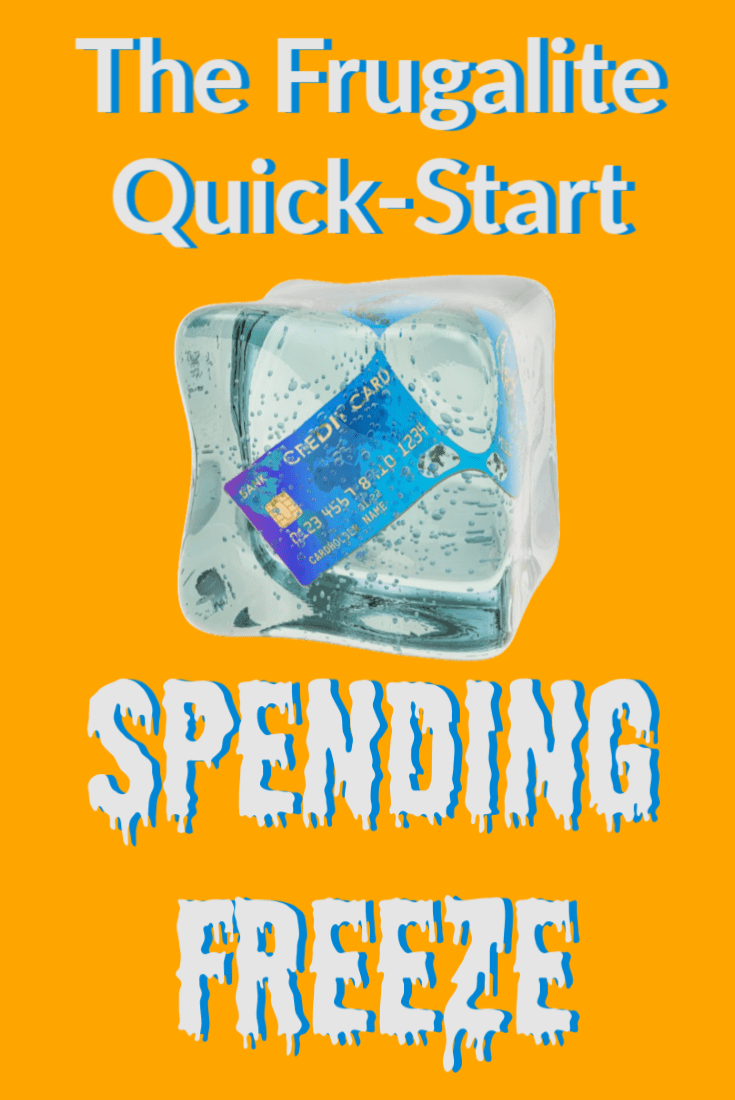

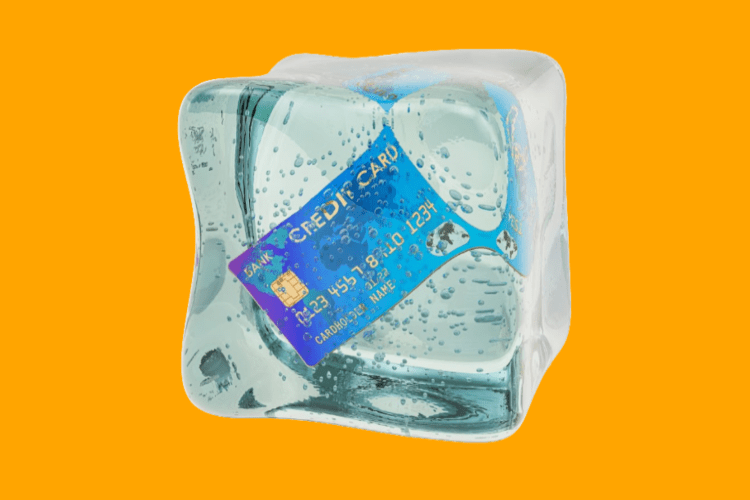
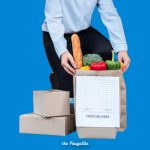

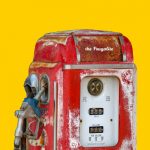

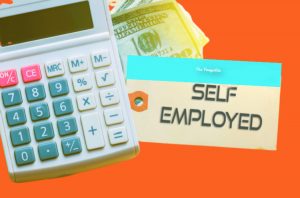
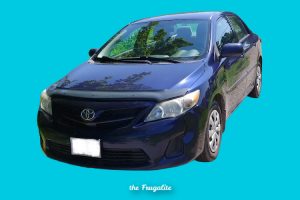
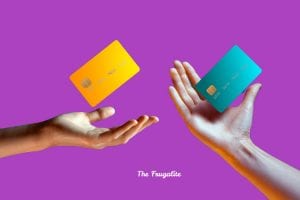


5 thoughts on “The Frugalite Quick-Start Spending Freeze”
The words spending freeze literally came into my head last week. I generally do majority of frugal/no spend habits but also are a prepper (which I need to unlearn as many things I was doing has now changed). We are very blessed as we have plenty of stuff & because of my prepping will not starve (though may not be what normally used to eating). January is usually my no spend month (with exception of buying for Valentine’s day when have sale I’ve been waiting for), especially since property taxes coming due, higher utilities (cold winter months/ lately in single digits & below zero wind chill), cost of gasoline rising again & starting drivers education/training, scheduled medical/dental/vision, and life changes occurring.
My bad/easy habit/ability is online sites, especially frugal sites I use. I am generally pretty smart about just looking (& putting on my wish lift) but lately many items on list are quickly selling as people make offer & is accepted (many offers I would make same price for). s9me items have bern waiting for that actually will use but was waiting for because of timing. I know I won’t die or anything but still sad because seeing so much empty shelves in stores & inability to get Products I wonder sometimes if continuing waiting (beyond few days) is always right.
we are preparing for moving/downsizing also & wanting to wait on many purchases as not sure where going to live/size. Luckily have been able to sell items (especially larger items) & donated many items also but still have things prepped for that no longer part of our life. Would like to get some money from these items but most likely will either pack & take or donate more items.
Do you consider no spend if get from someone or free store? we are fortunate that we have free store in community that you can take whatever you want (limits). I have been donating to for years instead of goodwill.
It’s notable that this article has appeared in mid-January when in many parts of the country sub-freezing weather is routinely expected. I remember long ago when my father would have to saddle his horse to ride into town for groceries because the snowed and iced-over roads were impassable by motorized vehicles. These days we see stories such as the recent I-95 survival challenges in Virginia that some people are better equipped than others to successfully handle.
So here’s my question: If you had a similar and really important trip planned for this time of year and you discovered that some of your preparedness supplies in your vehicle were either incomplete or in need of replacement for whatever reason, where would you put your priorities? On getting that gear and/or supplies replenished so you could handle a sudden stuck-in-the-wilds emergency, or would you regard a month’s challenge of spending zero money (above regular financial obligations) as more important in your priorities decision-making?
I’m not telling anyone what choices they have to make. I am suggesting however that sometimes being explicit about what your alternatives (and possible consequences) are can help you decide where your most important priorities are.
–Lewis
There can be a “big treat” due to being frugal. We paid off our house yesterday. Been making an extra payment to principle for a while. While we never spent that much before the pandemic, spending less while to keep ourselves and elderly relatives safe happened as a by-product. Balance was such that we still have adequate emergency savings after the pay-off. So now we’ll be paying ourselves the regular and extra payment. And we opted to not stop and treat ourselves on the way back from the bank. Came home and ate leftovers for dinner.
A spending freeze may provide peace of mind budget wise or put you a little closer to funding an upcoming need.
CONGRATULATIONS!!! That must be a wonderful feeling!
NEEDS or WANTS? Divide your shopping lists into these 2 simple categories and it will transform your spending patterns. 🙂